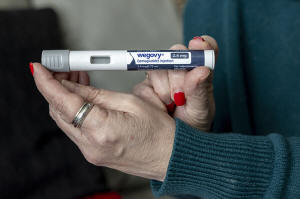About half of Americans approve of using weight-loss drugs to treat
obesity, AP-NORC poll finds
 Send a link to a friend
Send a link to a friend
 [February 01, 2025]
By KENYA HUNTER and LINLEY SANDERS [February 01, 2025]
By KENYA HUNTER and LINLEY SANDERS
More U.S. adults believe it is a good thing than a bad thing for adults
to use weight-loss drugs like Ozempic, Wegovy and other brands if they
are struggling with obesity or have a health condition tied to weight,
but they are not broadly supportive of teens who have obesity using the
medications, according to a new poll from The Associated Press-NORC
Center for Public Affairs Research.
When it comes to ages 12 to 18 who are dealing with obesity, Americans
are divided: About one-third say the use of weight-loss drugs in this
context is a “very” or “somewhat” good thing, a similar share say it's a
bad thing and about 3 in 10 say it isn't good or bad.
For adults, about half think it’s a good thing, and about 2 in 10 think
it’s a bad thing.
The popular weight-loss drugs known as GLP-1 receptor agonists, which
were originally meant to treat diabetes, surged in popularity after the
Food and Drug Administration approved them for weight loss in 2021. Now,
they're all over the place — celebrities, TV advertisements, social
media, news media, your neighbor.
Doctors and researchers say the injectable drugs are a effective tools
when it comes to treating obesity. The American Medical Association has
urged health insurance companies to cover the drugs, and the American
Academy of Pediatrics has said that doctors should consider giving the
medications to kids 12 and older who are struggling with obesity.
The AP-NORC poll results indicate that even as doctors urge the drugs'
use, some Americans continue to have concerns about weight-loss drugs,
particularly for teens and people who aren’t struggling with obesity.
Using obesity drugs
According to the Centers for Disease Control and Prevention, more than
100 million adults in the U.S. are obese — defined as having a body mass
index of 30 or higher — and more than 22 million adults are severely
obese, with a BMI of 40 or higher.

Obesity is classified as a chronic disease that needs medical attention,
because it can result from genetics, environmental factors and
socioeconomic factors. Patients who use the drugs as an extra boost to
lose weight can face criticism that they’re somehow “cheating,” said Dr.
Cate Varney, who treats patients with obesity at UVA Health in
Charlottesville, Virginia.
“It’s like telling somebody to nail a nail into a board and then giving
one person a hammer and another person, you know, like a chopstick,”
Varney said, adding, "we’re leveling the playing field with these
medications.”
Anjanette Ewen lost 67 pounds on Mounjaro, and credits that weight loss
as the reason she found a cancerous lump on her breast. The 50-year-old
from Fort Walton Beach, Florida, who responded to the AP-NORC poll, said
she had struggled to lose weight for years because of complications with
polycystic ovarian syndrome.
[to top of second column]
|

A woman holds up a dosage of Wegovy, a drug used for weight loss, at
her home in Front Royal, Va., on March 1, 2024. (AP Photo/Amanda
Andrade-Rhoades, File)
 Because of PCOS, which has a common
symptom of sudden weight fluctuations, Ewen went from 150 pounds to
220 pounds in eight months.
“I’ve been on a weight loss journey for forever, it seems like, and
nothing was working," she said.
About 20% of children in the U.S. have obesity, according to CDC
data. Dr. Gitanjali Srivastava, the medical director of obesity
medicine at Vanderbilt University School of Medicine, said obesity
is easier to treat in children than in adults.
“The youth actually respond beautifully to these medications,” she
said, adding that obesity at a young age increases the chance "of
having even severe and more profound obesity as an adult ... to the
point that you will actually have to have medications and or
bariatric surgery as an adult.”
Insurance coverage is an issue
Without insurance, out-of-pocket costs for the drugs can run
hundreds of dollars each time you fill a prescription.
The AP-NORC poll shows about half of Americans “strongly” or
“somewhat” favor having the federal programs Medicare and Medicaid
cover weight-loss drugs for people who have obesity, while about 2
in 10 are opposed the idea and about one-quarter have a neutral
view.
So far, Medicare, the health insurance program for 66 million
Americans 65 and older, doesn’t cover the drugs for obesity.
Coverage varies under Medicaid, which provides health insurance for
low-income Americans.
Some large companies with 500 employees or more and some Medicaid
programs are adding coverage. But many other employers and health
insurers are scaling back, with some citing treatment costs.
Using GLP-1s if you're not obese
You can’t get weight-loss drugs without a prescription, though there
are off-market compounds that people can purchase.
The AP-NORC poll showed that about 6 in 10 Americans believe it is a
“very" or “somewhat” bad thing for adults to take GLP-1s for weight
loss if they're not obese, and that increases to about 7 in 10 for
teens in the same situation.
Younger adults, though, are a little more open to the use of GLP-1s
for teens who aren't dealing with obesity. About 8 in 10 Americans
above the age of 45 believe it's a “bad idea” for teenagers who want
to lose weight by using the drugs but aren't obese, but about
two-thirds of American adults under the age of 45 hold the same
opinion.
___
AP Health Writer Tom Murphy in Indianapolis contributed to this
report. Hunter reported from Atlanta. Sanders reported from
Washington.
All contents © copyright 2025 Associated Press. All rights reserved |